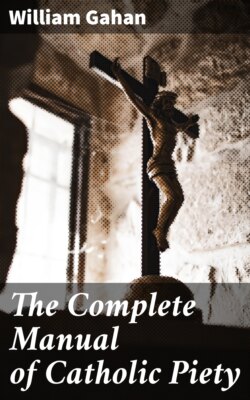Читать книгу The Complete Manual of Catholic Piety - William Gahan - Страница 9
На сайте Литреса книга снята с продажи.
Plenary Indulgences
ОглавлениеTable of Contents
Plenary Indulgences are granted to the faithful of this kingdom by complying with the usual conditions:—
On the feast of St. Patrick, or any day within the octave.
Item, on the feast of SS. Peter and Paul, or any day within the octave.
Item, at the hour of death, to such as devoutly invoke the sacred name of Jesus, at least with the heart.
The other Indulgences which are granted to the faithful of the Archdioceses of Dublin, on the feasts of the Nativity of our Lord, the Circumcision, the Epiphany, the Resurrection, the Ascension, Pentecost, Corpus Christi, on the five principal festivals of the Blessed Virgin, and the feast of All Saints, &c, are commonly published from the altars.
Note.—By an Indulgence is meant a relaxation or remission of the temporal punishment due to sins already forgiven, both as to the guilt and eternal punishment. Some Indulgences are called plenary; because, when the full effect of them is gained, they remit all the debt of temporal punishment: others are called partial; for example, an Indulgence of forty or an hundred days, or of three, seven, ten, fifteen, or more years; because the penitent is only thereby released in part, or from such a proportion of the debt of temporal punishment as was formerly enjoined by the penitential canons, according to the enormity of the crimes committed, and as would have been remitted by God, had the penitent undergone, for such a space of time, the severe canonical penances which were in use in the Church until the twelfth century.
The direct and immediate effect, therefore, of an Indulgence is, to remit the debt of temporal punishment, and not to pardon or remit sin, as it supposes sin already forgiven. But the sinner's repentance being seldom so perfect as to release him entirely from the whole punishment he deserves, on account of the injury he has committed against the Divine Majesty, there usually remains some debt of temporal punishment to be discharged, either in this world or in the next. For though the mercy of God is moved by a true repentance, to pardon the guilt and eternal punishment due in hell for mortal sin; yet his justice often substitutes in its place, and reserves some debt of temporal punishment, to which the repenting sinner is liable on account of his past sins; as appears evidently from several remarkable instances recorded in holy writ, particularly Adam, King David, Manasses, the Israelites, &c.
It is to discharge and cancel this debt of temporal punishment, that works of penance are enjoined in the sacred tribunal of Confession; and that the Catholic Church, like a compassionate and indulging mother, opens her spiritual treasures from time to time, to supply the wants and make up the deficiency of her children. In virtue of the power given to her by Jesus Christ, and in imitation of St. Paul, (2 Cor. x.) and several other renowned doctors and pastors who flourished in the purest ages of Christianity, she grants indulgences to such of the faithful as are properly disposed, and apply with fervour to those works of piety and religion, charity and penance, that are required on their part, as conditions necessary to gain the benefit of an indulgence.
